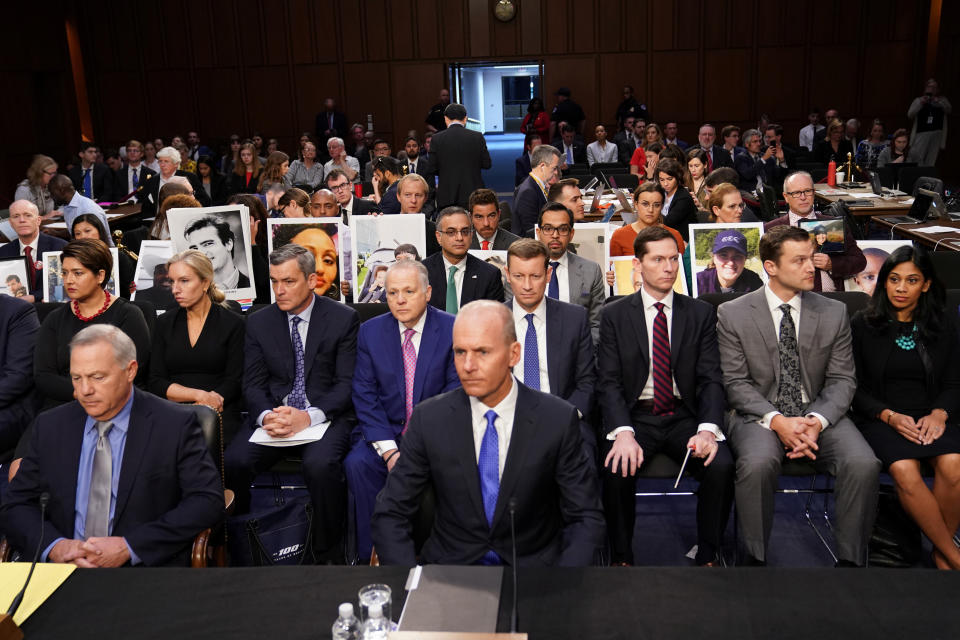What Boeing's CEO says may be used against it in the court of law, public opinion
Largely characterized as political theater, Congressional hearings currently underway still pose risks for Boeing (BA) — and its embattled CEO Dennis Mulienburg as the company tries to fend off civil litigation from passengers, customers and pilots.
The aerospace giant has been under pressure from all sides since two fatal crashes of the company’s flagship 737 Max jet. Amid ongoing probes of the two disasters, an investigation by the Department of Justice and growing questions about Boeing’s relationship with the Federal Aviation Administration (FAA), experts say Muilenberg’s words to Congress could easily come back to haunt the company.
“The potential liability to Boeing is crushing, and what he says are potential admissions that can be used in litigation,” Arthur Rosenberg, an aviation attorney who is representing families whose relatives died in the Ethiopian Airlines and Lion Air crashes, told Yahoo Finance.
In two-day hearings, lawmakers seized their first opportunity to directly question Mulienburg about the two disasters. Senators on Tuesday learned that the CEO knew of a 2016 text sent from Boeing’s then chief technical pilot to another Boeing pilot — before the second crash occurred — about MCAS, the computer system at the heart of global investigations into both accidents.
Clash over a troubled system

Shortly after takeoff from Jakarta, Indonesia on October 29, Lion Air Flight 610 crashed into the Java Sea. Meanwhile, Ethiopian Airlines Flight 302 crashed shortly after takeoff from Addis Ababa on March 10 — which prompted the FAA to ground the MAX on March 13.
Since then, Muilenburg has been under pressure, while Boeing has taken a staggering financial hit of $9.2 billion connected to the worldwide grounding.
Another legally sensitive issue raised at Boeing’s Senate committee hearing included a recently revealed 2016 email exchange that suggested the former chief technical pilot, Mark Forkner, had inadvertently lied to regulators about MCAS’ impact.
Other pertinent questions included why Boeing ultimately left out the existence of MCAS from the aircraft’s manual, and why the Max was equipped with fewer fail safe features than Boeing had installed on a military aircraft with an MCAS system. Also, lawmakers are pressing Boeing on its evaluation of the hazard level posed by its single angle of attack (AOA), a sensor designed to work in concert with MCAS.
In an exhibit displayed during the hearing, Texas Republican Ted Cruz read through one of the written communications from Forkner. The message said that the MCAS was “running rampant in the [simulated environment].”
Forkner was the FAA’s main point of contact at Boeing involved in evaluating the Max aircraft for certification, which Boeing was still testing in 2016 and which was certified as airworthy in 2017.
Muilenburg, however, insisted that he “didn't see the details of Forkner’s exchanges until recently,” he told senators. “And we're not quite sure what Mr. Porter meant by that exchange — his lawyer has suggested he was talking about a simulator."
Muilenburg said that he only became aware of Forkner’s text when it was produced in February in response to the federal government’s request for documents. Cruz suggested that the Ethiopian Airlines disaster in March may have been averted had Boeing’s executives acted upon the information contained in the text or emails.
"How did you not, in February, set out a nine alarm fire to say we need to figure out exactly what happened?” Sen. Cruz asked Muilenberg — who subsequently stated that he “counted on our team to make sure all the right authorities were notified.”
John Hamilton, Boeing’s chief engineer of commercial airplanes, has acknowledged that Boeing assigned an insubstantial hazard level to the MCAS system with respect to the AOA alert that he said had not been specifically tested for reliability. And in a lawsuit, the Southwest Airlines Pilots’ union argued that MCAS should have been categorized as a catastrophic failure risk, rather than a major failure risk.
Alan Diehl, a former cockpit designer, NTSB investigator, and FAA Human Performance Program Scientist, agreed, telling Yahoo Finance that “obviously we’ve got 346 dead people. That says, no, it should have been classified as catastrophic, and the FAA should have caught this.
He added: “The System Safety Analysis that Boeing did was inadequate and misleading, in my opinion.”
Boeing stock was off 1% on Wednesday from the previous day’s close, trading near $345.
Alexis is a reporter for Yahoo Finance. Follow her on Twitter @alexiskweed.
Read the latest financial and business news from Yahoo Finance
Follow Yahoo Finance on Twitter, Facebook, Instagram, Flipboard, SmartNews, LinkedIn, YouTube, and reddit.

